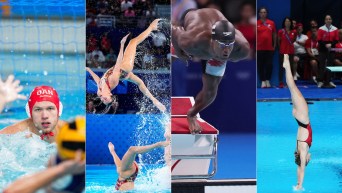2010 Winter Games More than Green Games
Final Sustainability Report Highlights Environmental, Social and Economic Legacies
The 2010 Winter Games were more than just green Games. They reached beyond the environmental pillar to deliver many other positive legacies locally and globally and they set a new sustainability blueprint for future large-scale sport events, according to the final Vancouver 2010 sustainability report which was provided to the VANOC Board of Directors and released today.
The final report is available now at http://media.olympic.ca/files/gamedocs/SUS-1261_Sustainability_Report_09-10.pdf and shares the successes and challenges on the road to 2010. It outlines how the Vancouver Organizing Committee for the 2010 Olympic and Paralympic Winter Games (VANOC) successfully expanded its definition of sustainability to include not only the environment but also social and economic opportunities that produced lasting benefits (see report summary below).
“We strived to make sustainability part of everything we did as an organization. Our team conducted its work with a spirit of integrity and tried to do what was right in every occasion,” said VANOC’s Chief Executive Officer, John Furlong. “While this wasn’t always easy, we met our commitments and we finished the Games knowing that we did our very best to reach our sustainability goals whenever and wherever possible. We hope our experiences can help our friends at the IOC and future Games organizers as they host the world to celebrate the best in sport and culture.”
As part of its legacy for future Organizing Committees, VANOC created a new sustainability governance model for large sport event organizations, reporting frameworks and a sustainable sport event tool kit for mega sport events. VANOC also demonstrated how a venue program can be designed for legacy use and built to minimize environmental impact, how partnerships with Aboriginal people can make a Games stronger, how socially and economically disadvantaged groups can participate and benefit from the Games, and how a greenhouse gas emissions can be reduced through unprecedented participation in a Games carbon offset program. Further examples and Games firsts are included in the final report.
IOC Olympic Games Executive Director Gilbert Felli said, “For nearly two decades, the IOC has been encouraging and working with the Olympic Movement to improve the sustainability of sport. With each edition of the Games, we take new strides forward, and VANOC has undoubtedly raised the bar once again. Vancouver 2010 showed that the Games and sport can be truly sustainable and leave great legacies to the host community. We are confident that VANOC’s work will leave a solid foundation upon which future Organizing Committees can build. Congratulations to the whole VANOC team for a job well done.”
The final report covers the period from August 1, 2009 to April 30, 2010 and documents VANOC’s sustainability performance leading up to and through Games time as well as the majority of the decommissioning phase post-Games. Overall, VANOC produced five annual sustainability reports to tell the sustainability story – what was promised, what VANOC had control over, and ultimately how VANOC performed against its goals.
As a core value and a strategic corporate objective, sustainability influenced the way VANOC approached challenges, opportunities and decision-making related to environmental, economic, social and legacy aspects of the Games. In addition to outcomes achieved in the 2009-10 reporting period, the report features legacies relating to each of VANOC’s six corporate sustainability objectives.
1. Accountability: a new sustainability governance model for a large sport event organization
2. Environmental Stewardship and Impact Reduction: Performance targets for green building construction, carbon management and waste reduction drove innovation and environmental performance across all aspects of the Games.
3. Social Inclusion and Responsibility: Sponsorship, construction, recruitment, procurement and community support were leveraged to share the economic and social benefits of the Games with inner-city, Aboriginal and other traditionally under-served populations.
4. Aboriginal Participation and Collaboration: Through formal agreements and protocols, VANOC recognized Aboriginal title on the shared traditional territories where the Games were held, providing for unprecedented Aboriginal Participation in all aspects of the Games.
5. Economic Benefits: Leveraged sponsorship, construction, recruitment and procurement to enhance the sustainability performance of the Games.
6. Sport for Sustainable Living: VANOC leveraged the interest in sport to raise awareness and inspire action on local and global sustainability solutions for businesses, communities and individuals.
Sustainability Report 2009-2010: http://media.olympic.ca/files/gamedocs/SUS-1261_Sustainability_Report_09-10.pdf




